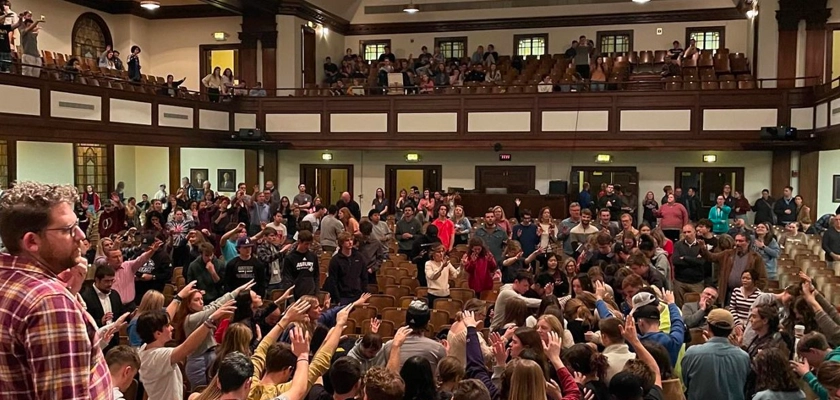YOU GOT THE POSITION... YOU'RE THE LEADER... NOW WHAT?
Menu

I use those quotes with great intentionality.
When news of the Asbury College service turned multi-day worship experience surfaced, I honestly thought, “sounds like something a bunch of 20-somethings would do.”
My second thought was, “What is a ‘revival,’ after all?”
I grew up mainly in a baptist church in and around south Atlanta. As a kid, our church hosted an occasional “revival,” and friends from other churches invited me to several of their revivals.
Even with my limited experience, the term took on a meaning. A “revival” was an evangelism mechanism meant to spread the Gospel. Less officially, it was about alter calls and counting raised hands (with every head bowed and every eye closed). We always ended these revival services by singing a hymn like “Into My Heart,” “I Surrender All,” or “Just As I Am.” We’d sing and sing until enough people made their way down to the front and the quota was met.
At the age of 10, most of the experience felt manipulated. The feeling really took hold in my heart when I (sinfully?) peaked as everyone else bowed their head and eyes closed. I heard the revival pastor counting hands and claiming salvations. I looked around, and there were no hands raised anywhere. He was counting to make us all feel like “it” worked.
So call me cynical. Or call me old. Or call me experienced. I don’t know. But I do know when the Asbury experience became public, I was one part curious and certainly one part critical.
As a pastor, I’ve seen my fair share of Nights of Worship and student retreat late-night worship moments. These moments can be moving, but they are mostly just moments. Emotional and powerful for some, but for the vast majority, they are moments.
I’ve been processing this since it began. Here is where I am:
What if we stopped labeling it anything.
I’ve written about this psychological phenomenon before. We love to label so we can categorize and better understand. It’s human nature. We labeled the Asbury experience a revival because we hoped to understand it. Or to categorize it.
I was talking with my oldest son today about Asbury. He’s a talented worship drummer and is pretty wise for 21. So I asked him his take. He responded,
“Why does it have to be labeled anything? Why can’t it just be?“
That stopped me in my curious/cynical tracks.
He’s right. Why must we label it anything?
Which brings me to my second take…
I like for things to “become.” My son also pointed this out to me over our lunch. I am a strategist and systems leader. My default is action.
What’s happening at Asbury should not be forced to “become” anything. What if it was allowed to just be?
What if we allowed these students and staff to pursue God with all their hearts, soul, mind, and strength?
What if we stopped trying to interrupt it? Or report on it? Or invade it? Or, as I said earlier, name it?
What if we allowed it to just be a move of God in a moment? It may become a crusade of sorts like the Jesus movement of the late 1960s and early 1970s. Or it could be a two-week moment in the lives of these students.
Either is fine. And we shouldn’t attempt to make it more than God is making it now.
As Jesus said in Mark 14:6 (NIV),
“Leave her alone,” said Jesus. “Why are you bothering her? She has done a beautiful thing to me.
As I grow older, I pray that I will become less cynical and more curious. I want to be separate from the older and established institutions that tend to fight against what’s new and not yet understood. I don’t want to ignore or criticize what I don’t understand.
That feels a lot like what the Pharisees did.
I want to be a supporter, not a detractor.
What about you?
